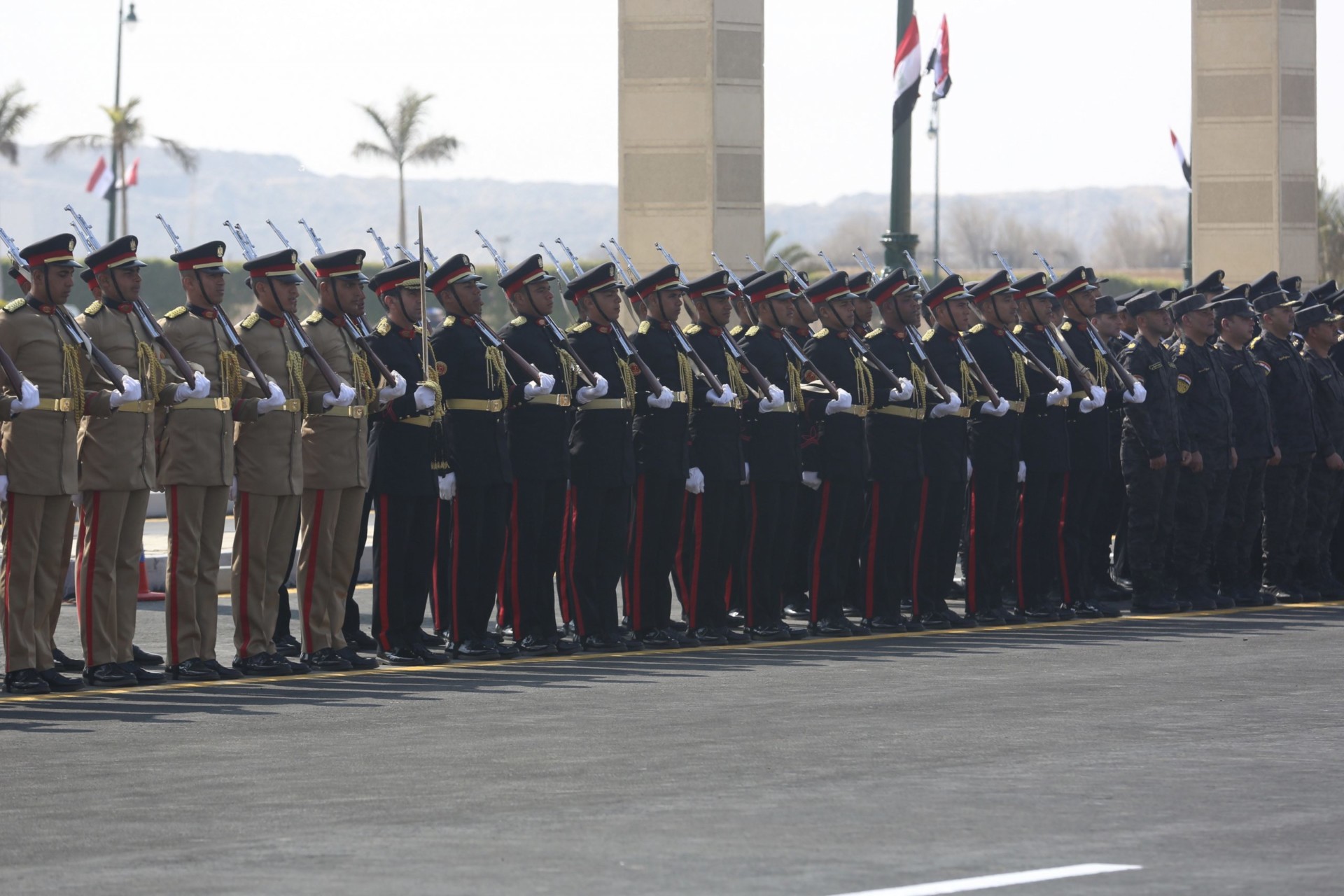The rise of Gen. Abdel Fattah al-Sisi to the position of defense minister in 2012 seemed to portend modernization for the Egyptian military. Speaking to officers during routine leadership conferences, on multiple occasions Sisi bemoaned how his predecessors had allowed the military to stagnate and stressed the need to correct course and “modernize” the armed forces. Diverse and robust new arms procurements have become a feature of Sisi’s rise to power and continue into his sixth year as president, with the Egyptian military now the third largest importer of weapons in the world despite the country’s economic fragility and growing levels of poverty.
However, while the military has focused its modernization efforts on rearming, it remains structurally and organizationally identical to the version that failed to modernize under former Defense Minister Mohamed Hussein Tantawi. Rather, the Egyptian officer corps’ steadfast protection of the status quo and resistance to reform among their ranks has consistently undermined military performance and obstructed the military’s ability to competently face 21st century challenges.
Decades of politicization and professional stagnation have seen the Egyptian military’s status as the Middle East’s preeminent military power has been superseded by its Gulf neighbors, which has unsurprisingly coincided with the decrease of Egypt’s regional importance. While Egypt today is arguably better-armed than it ever has been, thanks in part to over 40 years of U.S. military aid, untreated structural and organizational decay – exemplified by a critical lack of leadership and development in an overly powerful officer corps – has left the military struggling with its current security challenges, including a virulent insurgency in the Sinai peninsula by an Islamic State affiliate.
Without significant correction, the Egyptian military may become an increasingly unreliable and impotent partner that struggles to maintain long-term stability in the Arab world’s most populous country, despite the major monetary and material defense investment provided by the United States and other foreign allies. To address this growing malaise, the Egyptian military’s partners must look beyond superficial, quid pro quo engagement with high command and the prioritization of armament sales toward a more holistic, hands-on approach that emphasizes the necessity for reform and professionalization across the officer corps and the military more generally.
Shortcomings of the Officer Corps
Joining the ranks of the officer corps has become one of the only guaranteed avenues for social mobility and status rise in Egypt; in a country where public sector wages are stagnating and private industry jobs are few and far between, the relative security a military career provides and its added benefits make it an attractive prospect. Today, tens of thousands of young Egyptian men compete fiercely every year over several hundred places within the military’s various academies and colleges with aspirations to secure commissions and entry into this class and to fulfil their role as breadwinners in a society that relies heavily on its male youth for monetary support.
The military academies (one for each main branch of the military and a handful for specialist roles) are not just selective in terms of academic and physical standards but are also looking for a specific type of recruit. Candidates must be male, fresh high school or college graduates, unmarried, ineligible for any other citizenships, without any history of political activity, and from a “reputable” family (a background check that remains the single largest obstacle for the country’s poor and its religious and ethnic minorities). The Egyptian military purposefully selects young recruits without much life experience.
The requirements result in a pool of applicants that will be easily malleable to military life in general and who are particularly receptive to a unique warrior ethos that mixes ultra-nationalist and fundamentalist religious narratives (co-opting existing Islamist narratives to the favor of the state) extolling the exceptional qualities of the Egyptian soldier. These narratives effectually convince the country’s future officers of their rightful place as a ruling class, build loyalty to the institution, and dissuade recruits of any democratic values or ideas; the narratives hold that military officers are both the guardians and the masters of the nation, rather than career professionals and public servants uninterested in civil affairs or governance.
While selection is incredibly competitive for most recruits, others gain entry through their ability to access patronage networks or influence selection board decision makers. Though the military often denies this practice occurs, certain families (including al-Sisi’s) have had several generations of men enter the academy based on these connections. In recent years, falling standards within the Egyptian educational system and the current regime’s reliance on ultra-nationalist sentiment as a determinant of political loyalty have further affected selection of recruits.
Once a recruit is accepted, academy life itself is more akin to a finishing university than a rigorous officer selection and preparation process: The curriculum outside of specialist colleges is almost entirely civilian in nature, covering the sciences, mathematics, and information technology. Military subjects are largely covered in an academic setting, and while third year training includes practical experience with specific roles, they fall short of the extensive and holistic tactical training requirements needed to adequately prepare junior officers for field commands. The subject of leadership development itself is almost entirely absent in the curricula, relying on machismo and paternalism rather than professional standards. With the majority of Egypt’s combat forces being conscripted, there is little need for officers to place an emphasis on soldier development or fostering professional work environments, as captive soldiers are quickly replaced; poor unit management rarely is addressed outside of elite formations.
Ultimately, Egyptian officers are almost entirely reliant on rank and institutional authority to lead troops rather than asserting their position through effective management and technical expertise – a critical flaw in the system that has serious repercussions for the chain of command, esprit de corps. and operational needs. Consequently, appointments and promotions are mostly predicated on seniority and positions within patronage hierarchies rather than merit, an ailment that often results in subpar officers leading commands in specialist areas for which they have few relevant experience or qualifications, ultimately to the detriment of actual unit performance.
Meanwhile, junior officers with extraordinarily little life or work experience and who are relatively undertrained are suddenly responsible for dozens of conscripted soldiers and noncommissioned officers. Lacking the skills to effectively lead, junior officers are often mistrusted by their supervisors, an ailment that has deepened micromanagement issues within Egyptian units and stifled attempts at fostering a sense of mission command. The dominance of the officer corps has also left its noncommissioned counterpart brittle, technically deficient, and inexperienced, to be used as a chaperone for conscript forces rather than form the backbone of the military and offer capable mentorship. The result is that a significant core of the Egyptian military leadership fails to adapt quickly, has dogmatic ties with protocol, and fails to deal with emergent situations. Power is held so tightly by higher commands that the majority of Egypt’s officers often have little sway over operational functions within their respective formations.
Despite these inefficiencies, the officer class enjoys benefits disproportionate to the rest of the Egyptian population, which has struggled with high rates of poverty and the “belt-tightening” required for recent austerity reforms. The officer class enjoys lavish perks unavailable to the rest of Egyptian society, including generous wages that begin at more than double the national minimum, private medical coverage through the military’s shadow health care system, luxury subsidy packages for apartments or cars, post retirement work postings, and the enormous benefit of state protection. Their privileged status offers avenues for corruption as civilians across the country seek to gain favor with officers, and state protection insulates the officer class from accountability in cases of misconduct, negligence, corruption, and criminality – even in cases of potential war crimes or the murder of fellow soldiers.
North Sinai Insurgency
The implications of these failings have been especially obvious in North Sinai. Despite estimates putting the size of the militant organization at fewer than 1,000 fighters, the Islamic State’s Sinai Province has threatened the Egyptian mainland, conducted deadly terrorist attacks against the country’s religious minorities, downed a civilian airliner, targeted Suez Canal traffic, and launched several attacks across the border with Israel.
Unable to dismantle a small insurgency and suffering consistent and heavy casualties, the Egyptian military and its officer corps have shied away from making the changes and reforms necessary to eliminate the tactical and operational frailties exposed by the conflict. While there have been attempts to remedy the situation, these measures have been largely superficial, focusing on minor improvements to equipment and conscript training rather than addressing issues of centralized command rigidity, a disempowered NCO corps, problematic conscription practices, and poor overall leadership. While officials from the Egyptian military and government have emphasized the success security forces have achieved against militants across the country, the high death toll among troops and civilians in North Sinai has been allowed to pass without any real accountability or scrutiny.
Alongside the exposure of the armed forces’ martial weaknesses, the war in North Sinai has also uncovered the military’s propensity for misconduct and its willingness to use heavy firepower in urban areas, punitive actions, and forms of collective punishment on its own territory. Investigations by multiple international and local rights groups have documented extrajudicial killings, arbitrary mass arrests, forced disappearances, and widespread use of punitive measures by security forces against Egyptian nationals during combat operations over the past seven years. While the Egyptian military has consistently denied any wrongdoing, evidence used in the documentation of these abuses has been sourced from the armed forces’ own media outlets and from the online accounts of personnel deployed to the restive peninsula.
Though these accusations are not particularly new, they do speak to a breakdown in moral leadership, unit professionalism, and discipline as well as a general disregard for the civilian populations caught in the crossfire between the military and militant organizations. Misconduct appears to be not just accepted but actively promoted by middle and junior officer leadership as a means of exacting revenge against militant organizations that have caused heavy military casualties; this has included the mutilation of deceased militants, the abuse of detainees, and direct involvement in extrajudicial killings.
Recommendations
While there is little hope of significantly altering the Egyptian military’s political domination, a more hands-on engagement from international allies that seeks to emplace itself in or influence the armed forces’ educational establishments and seriously engage with professional cadres within the officer corps may yield results if there is emphasis on the need for internal accountability and scrutiny in instances of failure and misconduct in addition to general organizational reforms. To work toward this end, Egypt’s international partners may be served well by expanding officer candidate school cadet exchange programs, establishing joint in-country tactical level training centers, opening embed positions in their own forces for frontline unit personnel, increasing the frequency of worthwhile exercises, promoting credible professional military education to senior leadership, putting more enlisted personnel through relevant battle schools, and providing training opportunities for underrepresented troops across the force, including women.
Egypt Defense Review is a pseudonym for an Egypt security defense analyst who provides critical perspectives on Middle East and North Africa security issues.
The views expressed in this article are those of the author and not an official policy or position of the Newlines Institute.






